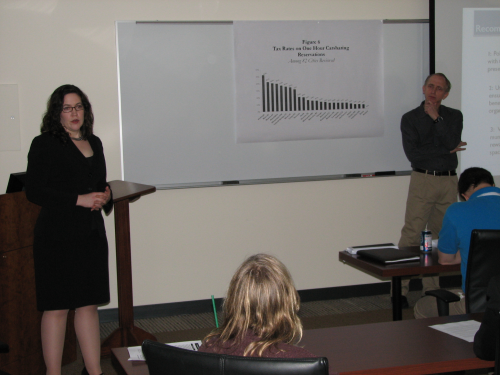Jun 27, 2011
Despite Environmental Benefits of Car Sharing, Many State and Local Governments Impose Punitive Taxes on Industry
Despite Environmental Benefits of Car Sharing, Many State and Local Governments Impose Punitive Taxes on Industry
Car-sharing services have soared in popularity across the country in recent years and currently have more than a half million enrollees, in part because of the financial advantages to users and the environmental benefits to the larger communities where the services are located.
Yet many municipalities levy disproportionately high taxes on the services, thus discouraging even greater use, according to a study by
The study found that among the 25 largest cities offering car-sharing services, combined taxes on one-hour service averaged 17.93 percent, more than double the sales tax rates in these same municipalities. The study also found:
Aggregate taxes on car-sharing services were higher than on most other forms of consumer transportation, including airlines, rail, buses and private vehicles;
Car-sharing service users were the only ones to pay gasoline taxes twice—while filling the vehicles and as part of the rates they pay for leasing; and
State and local tax rates on car-sharing services are often comparable to the “sin taxes” levied on tobacco products and alcoholic beverages.
“The economic disincentives created by excessively high taxation on car-sharing services run counter to sound public policy,” said Joseph Schwieterman, professor of public service and director of the Chaddick Institute, who co-authored the study with graduate student Alice Bieszczat. “The rising tax burden on car rentals is having serious unintended consequences with particularly damaging effects on neighborhood car sharing”..
Membership in car-sharing services, which typically provide access to cars for periods of between one and 24 hours, has grown steadily since the concept was first introduced in the late 1990s. But since oil and gasoline prices spiked dramatically in 2008, enrollment nationally in car-sharing services has nearly doubled and totaled about 518,000 members at the start of 2011. Car-sharing services are available in markets in all but six states in the
A number of prior academic studies have shown that car-sharing services, whether operated by for-profit or nonprofit companies, have demonstrable positive impacts on the environment by encouraging many participants to either get rid of an existing vehicle or to defer the purchase of one. This in turn encouraged more pedestrian activity and use of bicycles and mass transit for those activities where having a personal vehicle is less essential. Grocery shopping was the primary activity cited by users of car sharing services.
The decreased reliance on automobiles in turn provides a number of environmental benefits, including reduced emissions of greenhouse gases. Past studies have shown that on average, each vehicle in a car sharing program eliminates up to 15 personal automobiles relieving traffic congestion in the cities where they are most popular.
A copy of the full report can be found at:
Charts and maps highlighting some of the studies finding can be found at:

DePaul researchers Alice Bieszczat and Joseph Schwieterman present findings on their study of the negative impact state and local taxes are having on the car-sharing industry.
